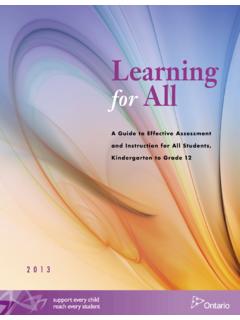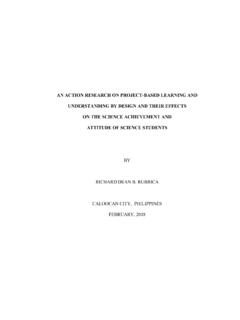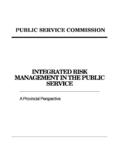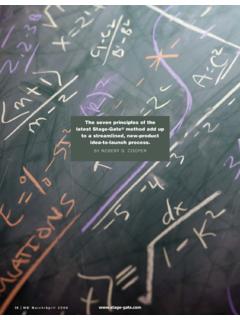Transcription of ASSESSING SCHOOLS AS PROFESSIONAL LEARNING …
1 ASSESSING SCHOOLS AS PROFESSIONAL LEARNING COMMUNITIES SYMPOSIUM Dianne F. Olivier, Ph. D. Educational Foundations and Leadership University of Louisiana at Lafayette Sandra Antoine University of Louisiana at Lafayette Iberia Parish School System - Ronald Cormier University of Louisiana at Lafayette Iberia Parish School System - Virginia Lewis University of Louisiana at Lafayette Iberia Parish School System Cheri Minckler Manufacturing Extension Partnership of Louisiana University of Louisiana at Lafayette Molly Stadalis University of Louisiana at Lafayette St. Mary Parish School System - Paper presented at the Annual Meeting of the Louisiana Education Research Association Lafayette March 2009 2 ASSESSING SCHOOLS AS PROFESSIONAL LEARNING COMMUNITIES SYMPOSIUM INTRODUCTION PROFESSIONAL LEARNING COMMUNITIES ASSESSMENT REVISED Dianne F.
2 Olivier, Ph. D. Department of Educational Foundations and Leadership University of Louisiana at Lafayette Paper presented at the Annual Meeting of the Louisiana Education Research Association Lafayette March 2009 3 ASSESSING and Analyzing SCHOOLS as PLCs If educators are indeed persuaded that transforming SCHOOLS into PROFESSIONAL LEARNING communities offers the best strategy for school improvement, a clear vision of what a LEARNING community looks like and how people operate in relation to this concept must be established. In order to visualize the culture in which PLCs exist, a portrait of LEARNING communities can be sketched by examining the dimensions and critical attributes forming the PROFESSIONAL LEARNING community. Additionally, investigation into organizational dimensions linked to these critical attributes can provide a more comprehensive description and understanding of the impact of the LEARNING community.
3 The complexity that exists in identifying SCHOOLS as PLCs offers a challenge for researchers, principals, staff, parents, and other stakeholders. While many principals and faculties conceptualize their SCHOOLS as organizations operating as LEARNING communities, they rarely meet the operational criteria. SCHOOLS that are operating as PLCs must have a culture in which LEARNING by all is valued, encouraged, and supported. Within such communities, the staff, intentionally and collectively, engage in LEARNING and work on issues directly related to classroom practice that positively impacts student LEARNING (Cowan & Hord, 1999, p. 4). In ASSESSING the level of progress along a continuum of PLC development, specific school and classroom practices can be measured as determining factors for school renewal. Thus, analysis can further be enhanced by assessment and subsequent analyses of organizational variables, such as collective efficacy and leadership capacity, factors seemingly related.
4 4 Our conceptualization of the PLC dimensions and related attributes, and the development of the PROFESSIONAL LEARNING Community Organizer (PLCO) (Huffman & Hipp, 2003) created a need for a formal diagnostic tool. This new instrument was developed to align staff perceptions and day-to-day actions and to more accurately represent phases of development in becoming a PLC: initiating (starting), implementing (doing), and institutionalizing (sustaining) (Fullan, 1995; Stoll, McMahon & Thomas, 2006). PROFESSIONAL LEARNING Community Assessment - Revised While many SCHOOLS , with the best intentions, choose to use the PLC label, we felt it essential to accurately assess the level of effectiveness of PLC characteristics. In an effort to gauge the level at which SCHOOLS function along the continuum of PLCs, a survey measure was developed to assess teachers perceptions of critical attributes within their LEARNING organization.
5 Additionally, this tool was designed to assist school personnel in identifying practices that successfully contribute to becoming and sustaining a PLC. Initially, the PROFESSIONAL LEARNING Community Assessment (PLCA) (Olivier, Hipp, & Huffman, 2003) was created to assess everyday classroom and school level practices . Over the last five years, this assessment has successfully assisted educators and researchers in determining the strength of practices within each PLC dimension. Recognition of a need to more inclusively assess levels of practice relating to utilization and analyses of data has resulted in an extension of the original measure. The integration of specific items within each of the PLC dimensions identifies data as an essential tool. This aligns with Hord and Hirsh s (2008) assertion that Staff LEARNING precedes student LEARNING , and its focus derives from the study of both student and staff 5 data that reveal specific needs.
6 Thus the staff engages in intentional and collegial LEARNING aligned with needs and goals determined by data (p. 29). This refined measure, PROFESSIONAL LEARNING Community Assessment-Revised (PLCA-R), continues to serve as an effective formal diagnostic tool for identifying school level practices that enhance intentional PROFESSIONAL LEARNING . Purposely, the PLCA-R provides perceptions of the staff relating to specific practices observed at the school level with regard to shared and supportive leadership, shared values and vision, collective LEARNING and application, shared personal practice, and supportive conditions, including both relationships and structures. The measure has been administered to PROFESSIONAL staff in numerous school districts at varying grade levels throughout the The widespread use of the instrument has provided an opportunity to review the dimensions for internal consistency.
7 Initial and subsequent studies have provided ongoing validation of this diagnostic tool. (Our intention is to share the ongoing validation and refinement process for this effective diagnostic measure. For development and validation procedures of the initial measure refer to Huffman and Hipp, Chapter 8, ASSESSING SCHOOLS as PLCs, 2003). Our most recent analyses of this diagnostic tool has confirmed internal consistency resulting in the following Cronbach Alpha reliability coefficients for factored subscales (n=1209): Shared and Supportive Leadership (.94); Shared Values and Vision (.92); Collective LEARNING and Application (.91); Shared Personal Practice (.87); Supportive Conditions-Relationships (.82); Supportive Conditions-Structures (.88); and a one-factor solution (.97). This latest analysis also provided an opportunity to review descriptive statistics for each item. Mean scores for the measure resulted in a high of 6 within the Collective LEARNING and Application dimension (School staff is committed to programs that enhance LEARNING ) to a low of within the Shared Personal Practice dimension (The staff provide feedback to peers related to instructional practices ).
8 The PROFESSIONAL LEARNING Community Assessment-Revised (PLCA-R) (see Figure ) utilizes a four-point, forced Likert scale ranging from 1 = Strongly Disagree to 4 = Strongly Agree. The refinement of this PLC measure incorporates seven new statements directly addressing the utilization of data as a school level practice. To verify the relevance of the new items developed relating to data, an Expert Opinion Questionnaire was designed to assess and analyze responses from individuals within the education field having knowledge about the original PLCA measure and/or attributes of PROFESSIONAL LEARNING communities. This Expert questionnaire requested that respondents read each proposed measure statement and rate each item in terms of its relevance to more directly speak to data practices within a PROFESSIONAL LEARNING community assessment. The 3-point rating scale included the following responses: H/(3) = high level of importance and relevance to PLCA instrument revision; M/(2) = medium level of importance and relevance to PLCA instrument revision; and L/(1) = low level of importance and relevance to PLCA instrument revision.
9 Thus, the proposed items were assessed in terms of the importance and relevance to data utilization and the appropriate fit within the PLCA dimensions. The panel of experts consisted of school administrators and teachers, district and regional education supervisory personnel, university faculty and staff, educational 7 consultants, and doctoral students studying PROFESSIONAL LEARNING communities. Findings from the Expert Opinion Questionnaire resulted in 51 usable surveys in which the seven items were rated, on the 3-point scale, from a high of (Staff collaboratively analyze evidence of student LEARNING as critical data for improving teaching and LEARNING ) to a low of (Data are organized in a way to provide easy access to staff). As noted by ratings and comments from panel members, overall strong support was indicated for the inclusion of all proposed items. Numerous comments expressed approval.
10 One principal stated .. I conducted the PLCA this past am very excited to see that you are contemplating adding the data component to each of the strands of the PLCs; An educational consultant and regional education staff member concluded, I really like the new items and think they are a good addition to the existing survey. The new items support what our office [regional education office] suggests about using data to inform instruction. The PLCA revision process also sought feedback from several researchers and doctoral students who had utilized the measure, as to their perceptions of the viability of the instrument. Responses were overwhelmingly positive and indicated the feasibility of utilizing the PLCA-R to assess the practices observed at the school level relating to the PLC dimensions. Table provides comments from researchers, doctoral students, and practitioners who have administered and utilized results from the original PLCA measure.










